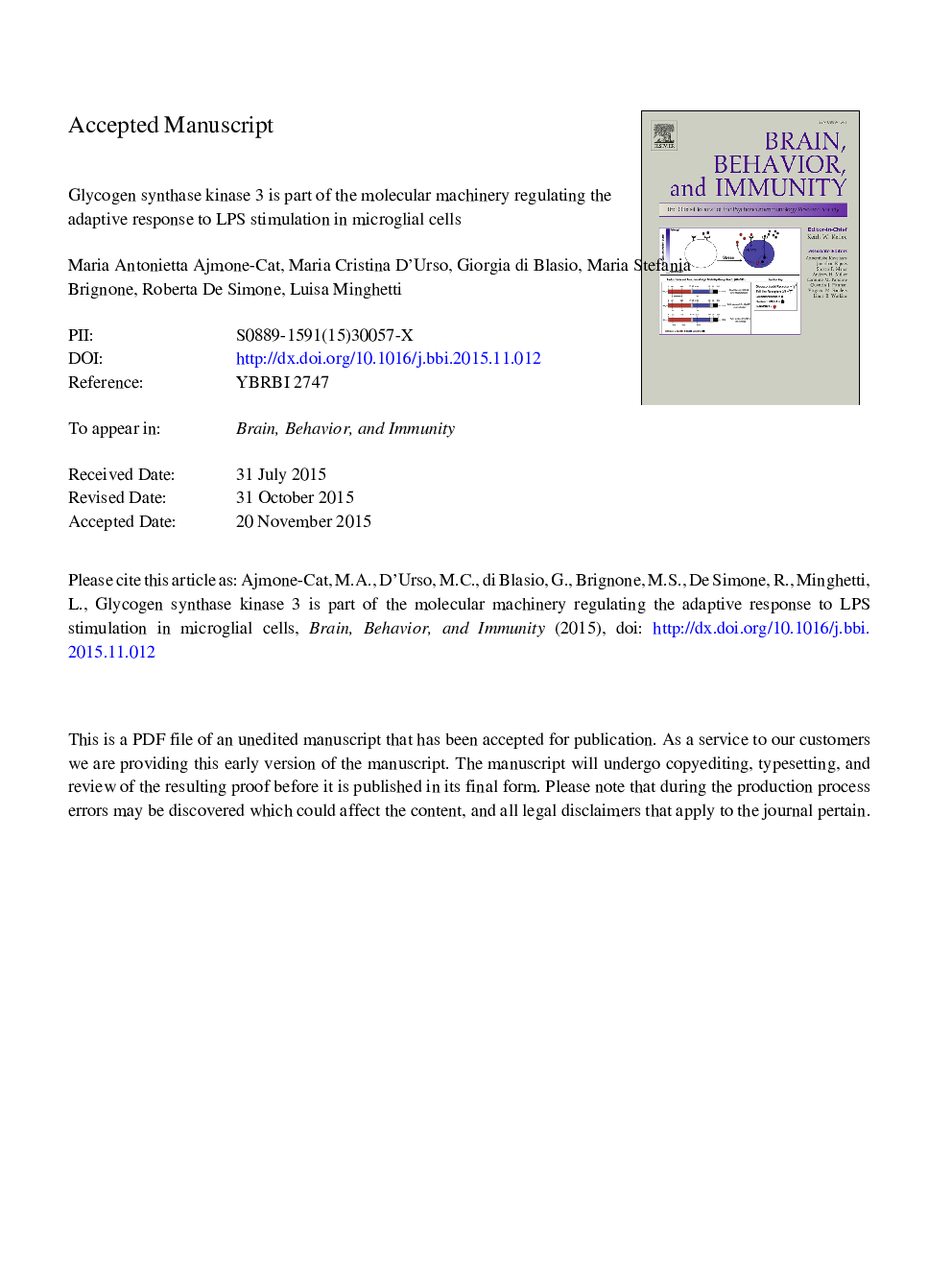| کد مقاله | کد نشریه | سال انتشار | مقاله انگلیسی | نسخه تمام متن |
|---|---|---|---|---|
| 7280380 | 1473912 | 2016 | 44 صفحه PDF | دانلود رایگان |
عنوان انگلیسی مقاله ISI
Glycogen synthase kinase 3 is part of the molecular machinery regulating the adaptive response to LPS stimulation in microglial cells
دانلود مقاله + سفارش ترجمه
دانلود مقاله ISI انگلیسی
رایگان برای ایرانیان
کلمات کلیدی
موضوعات مرتبط
علوم زیستی و بیوفناوری
ایمنی شناسی و میکروب شناسی
ایمونولوژی
پیش نمایش صفحه اول مقاله

چکیده انگلیسی
Repeated stimulation of TLR4 signaling by lipopolysaccharide (LPS) in microglia induces a state of tolerance/sensitization consisting in the reprogramming of the expression of pro-inflammatory genes in favor of anti-inflammatory ones. The molecular mechanisms underlying this adaptive response are far to be elucidated. Glycogen synthase kinase 3 (GSK3) has emerged as crucial regulator of TLR signaling, mediating the balance between pro- and anti-inflammatory functions in both periphery and central nervous system. The present study extends this notion identifying GSK3 as part of the molecular machinery regulating the LPS-adaptive response in microglial cells, by using primary microglial cultures and organotypic hippocampal slices (OHSCs). We found that lithium chloride (LiCl), a widely used GSK3 inhibitor and the mainstay treatment for bipolar disorder, reinforced the LPS adaptive response by enhancing both downregulation of pro-inflammatory genes (inducible nitric oxide synthase, interleukin 1β, interleukin 6, tumor necrosis factor α), and upregulation of genes typically associated to anti-inflammatory functions (interleukin 10 and MRC1). The effects of GSK3 inhibition were mimicked by Wnt3a, added exogenously, and reversed by Inhibitor of Wnt-Response-1-endo, a pharmacological disruptor of the canonical Wnt/β-catenin pathway, and GW9662, a selective peroxisome proliferator activated receptor γ antagonist, suggesting that these two pathways are involved in the regulation of LPS-tolerance/sensitization by GSK. Finally, LiCl treatment of OHSCs enhanced the protective functional consequences of the microglial adaptive response to LPS on oligodendrocyte maturation, as indicated by MBP mRNA upregulation. These results further indicate GSK3 as key component in the orchestration of neuroinflammation and target for neuroprotective strategies.
ناشر
Database: Elsevier - ScienceDirect (ساینس دایرکت)
Journal: Brain, Behavior, and Immunity - Volume 55, July 2016, Pages 225-235
Journal: Brain, Behavior, and Immunity - Volume 55, July 2016, Pages 225-235
نویسندگان
Maria Antonietta Ajmone-Cat, Maria Cristina D'Urso, Giorgia di Blasio, Maria Stefania Brignone, Roberta De Simone, Luisa Minghetti,